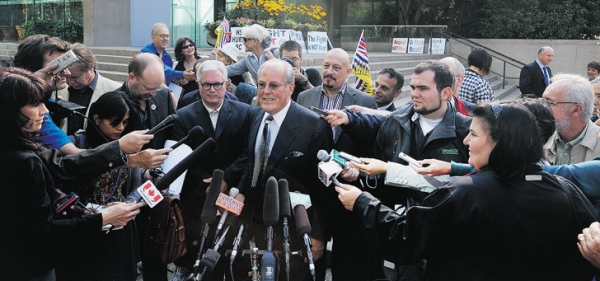Whatever course they take, expect them to keep stumbling and sink deeper
Vaughn Palmer
Sun

Former B.C. premier Bill Vander Zalm, one of the key organizers of the anti-HST petition, speaks to the media after Friday’s court judgment rejecting the attempt by six business groups to derail the initiative. Photograph by: Stuart Davis, Vancouver Sun, Vancouver Sun
As the organizers of the campaign against the harmonized sales tax celebrated a victory in court Friday, the B.C. Liberals continued their stubborn defence of the much-hated tax.
“We still believe it is the best tax structure for B. C,” said Finance Minister Colin Hansen. “Instead of being a drag on the economy, as the old provincial sales tax was, it is one that will stimulate the economy and job growth.”
Far from convening the legislature to adopt the proposed-by-petition HST Extinguishment Act as anti-HST organizers demanded, Hansen said the government would instead follow the letter of the lengthy procedure set down in law for handling legislative initiatives.
“There is a process there and we will make sure that it is followed,” Hansen told reporter Jeff Lee of The Vancouver Sun. “Obviously, the sooner we get through it, the better for everybody.”
Sooner would surely be better for him and his colleagues. But I see no way they will be through this thing any time soon.
The next step in the process is the one set down by B.C. Supreme Court Chief Justice Robert Bauman in his 13-page decision rejecting the attempt by six business groups to derail the initiative.
“I would respectfully ask that the chief electoral officer perform his remaining duties under the Recall and Initiative Act forthwith,” wrote the judge. Meaning, as he noted elsewhere, the electoral officer should: “Advance the initiative petition and the draft bill accompanying it to the select standing committee of the legislature.”
But the select standing committee on legislative initiatives has no ability to move the measure to any definitive resolution. Its powers are limited to considering the contents without making any changes.
The Liberals inexplicably filled their six slots on the committee with inexperienced rookies and obscure back-benchers. The four New Democrats, led by house leader Mike Farnworth, are among the most experienced on the Opposition side.
If the Liberals try anything cute in the procedural realm, they are likely to be outmanoeuvred. They might try to convene hearings on the tax. But those would only provide another platform for attacks on the government.
Most likely committee members will convene in Victoria sometime in September, argue among themselves for as long as they can stand it, then opt for one of the two courses of action set down in the initiative act before the end-of-December deadline.
Either they recommend the HST Extinguishment Act to the legislature for the session scheduled to begin in February 2011. Or they vote thumbs down, effectively sending it to a provincewide initiative vote (much like a referendum), which would be held in September 2011. Either route is fraught with pitfalls for the government.
The legislature, as underscored in the court judgment, does have the leeway to reject the measure or tinker with the contents. Some Liberals would like to use the legislative process to broaden the debate around the HST by, say, forcing consideration of what would happen if the province did extinguish the tax.
Suppose the government added an amendment that would force the province to cut spending or increase taxes to the degree necessary to pay back the $1.6 billion in federal transition funding for the HST. Might that force the New Democrats to climb down off the fence and say what they would do about the tax?
But any parliamentary manoeuvring to preserve the tax would open the Liberals to accusations that they were defying the “will of the people” as expressed in the petition.
Other Liberals favour the referendum option, never mind the estimated $30-million cost of staging a provincewide vote. Because the day of reckoning would be postponed to the fall of next year, they hope by then people might have become used to the tax.
Plus the unique law surrounding what is technically called “an initiative vote” requires approval by 50 per cent of all registered voters, not just 50 per cent of those who cast a ballot. Not all that likely in these days of 50-per-cent turnouts.
Some Liberals figure the government could diminish the chances of passage by adding a second question to the referendum, making repeal of the HST contingent on, say, public approval of the means to come up with the $1.6 billion necessary to compensate Ottawa.
Still the government would be rolling the dice. If the anti-HST measure were endorsed by 50 per cent of the electorate, the government would be compelled to abide by the verdict, humiliating and expensive though the backdown would be.
Each of these scenarios could have an impact on the separate, though related process of recall. Recall procedures are designed to be tough, but the chances of success would be boosted by any further government bungling on the initiative petition.
From the day the Liberals sprang the HST on an unsuspecting public 13 lucky months ago, they’ve not put a foot right on their handling of the file. On that basis, bet that whatever course of action they choose to follow in the months ahead, the decline and stumbling will continue.
© Copyright (c) The Vancouver Sun

